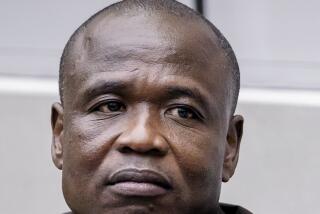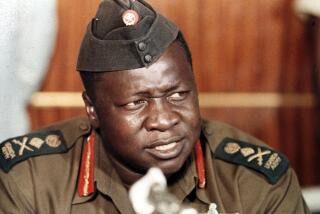Arrest warrant for Kadafi may complicate Libya conflict
The international arrest warrant for crimes against humanity issued against Moammar Kadafi and members of his family has further isolated the Libyan leader, but may also increase his determination to fight on rather than relinquish power or seek sanctuary outside the country.
With the military standoff between NATO-led and pro-Kadafi forces surpassing 100 days, the International Criminal Court in The Hague on Monday named Kadafi, his son and brother-in-law as wanted men. The court alleged that the leaders ordered or encouraged their forces to gun down and imprison hundreds of Libyan civilians in the early days of the antigovernment uprising that broke out in February.
The warrants will be difficult to enforce. The 69-year-old Kadafi’s precise whereabouts are unknown except to his inner circle. NATO countries have shown no desire to add ground troops to the fight. And although rebel forces welcomed the indictments, their ability to capture the heavily defended capital, Tripoli, remains a tall order.
“It has symbolic significance,” said Shashank Joshi, an expert at the Royal United Services Institute, a London-based think tank. Kadafi has little motivation now to surrender, he said, and the options of whether to fight on or give in “are the same as they were yesterday.”
But as a specter hanging over Kadafi, the warrant could complicate any attempts at a diplomatic resolution to the conflict. If the longtime leader were ever to entertain the notion of stepping aside and slipping into exile, a deal would have to address his likely insistence on being shielded from arrest.
“It makes it a little more difficult but not impossible,” Joshi said. “We shouldn’t go overboard and say this excludes any political settlement, any kind of exile. But it does raise the costs Kadafi has to consider.”
Kadafi may also take comfort from the fate of Sudanese President Omar Hassan Ahmed Bashir, the only other head of state to be wanted by the International Criminal Court. Bashir’s warrant was issued more than two years ago, but he remains free and has traveled without impediment to other African countries, some of which are among the scores of nations that are not signatories of the ICC.
Kadafi enjoys support from a few African countries that have benefited from his largess and could seek haven in one of those.
Despite questions about whether the arrest warrants make it harder to dislodge Kadafi, the U.S. State Department’s chief spokeswoman defended the move.
“The U.S. believes that the decision to refer the case to the ICC was the right decision, that the ICC has spoken now about the need for justice and accountability,” Victoria Nuland told reporters in Washington. “With regard to whether this hurts or helps, it doesn’t change the fact that Kadafi has got to take the message that it’s time to go.”
The U.S. is among the nations that have not signed on to the court, saying that American soldiers deployed overseas could be vulnerable to politically motivated prosecution.
The Libyan government poured scorn on the warrant before it was even issued. In anticipation of the order, spokesman Musa Ibrahim told reporters Sunday that Tripoli did not recognize the authority of the International Criminal Court.
“The ICC has no legitimacy whatsoever,” Ibrahim said. “We will deal with it.”
But in the rebel-held western mountains, opposition fighters and their supporters cheered and fired their AK-47s in celebration at the news.
“He deserves more than being taken to jail,” said Mohammad Adel, a 21-year-old engineering student in the city of Zintan. “He deserves to be treated like Saddam Hussein. He deserves to be hanged.”
The 43-page warrant cited numerous incidents from the first two weeks of the rebel uprising in which loyalist forces allegedly mowed down protesters with gunfire, threw some dissidents in jail and tortured others by administering electric shocks to their genitals or hanging victims upside down and whipping them.
Kadafi was responsible for the brutal suppression as Libya’s supreme leader, his son Seif Islam Kadafi as its “de facto prime minister” and his brother-in-law Abdullah Sanoussi as its chief of military intelligence, the court said.
In an attack Feb. 21, the warrant said, government snipers opened fire outside mosques in Tripoli, killing at least 100 people. In the eastern city of Benghazi, which eventually fell to the rebels, Kadafi’s forces allegedly beat protesters with clubs and swords and sprayed them with acid.
Kadafi wielded “absolute, ultimate and unquestioned control over the Libyan state apparatus of power,” the court said, identifying Seif Islam and Sanoussi as two of his closest confidants.
The warrant also accused the three men of trying to cover up the security forces’ actions by threatening journalists and even ordering dead bodies removed from hospitals.
ICC prosecutor Luis Moreno-Ocampo submitted a request for the arrest warrants last month, and their issuance Monday was no surprise. Still, they were welcomed by NATO powers as further proof of Kadafi’s increasing isolation.
They also more closely link Kadafi’s fate to the outcome of a mission authorized by the U.N. Security Council as a humanitarian intervention to protect civilians.
“The fact is we turned up the pressure on Kadafi,” British Prime Minister David Cameron told Parliament. “We should keep that pressure up, because the pressure is beginning to tell.”
On Monday, North Atlantic Treaty Organization warplanes continued their assault on Libyan security forces, with two loud explosions reported near Kadafi’s compound in Tripoli. The Libyan government said NATO missiles hit the leader’s personal bus in the compound and injured two people slightly, the Associated Press reported.
Fighting has also intensified in western Libya as anti-Kadafi forces try to close in on Tripoli from the west and the rebel-held east. A fierce aerial assault by NATO jets is backing the effort.
A senior United Nations official said Monday that the rebels seemed to be turning the tide against the government.
“It is clear that the initiative, although halting, is now with the opposition forces, supported at times by NATO airpower,” B. Lynn Pascoe, the undersecretary-general for political affairs, told the U.N. Security Council.
He added that diplomatic efforts were continuing.
Times staff writer Borzou Daragahi in Zintan contributed to this report.
More to Read
Start your day right
Sign up for Essential California for news, features and recommendations from the L.A. Times and beyond in your inbox six days a week.
You may occasionally receive promotional content from the Los Angeles Times.







